
Whether you call it criticism or judgment, this kind of feedback never feels good. But what do you do when you’re dealing with someone who always seems to be belittling, condemning, or finding fault with everything you say or do? When the feedback feels harsh or disapproving, how do you say something without sounding defensive? Today you’ll learn why people are critical and my top five strategies to gain peace and boundaries in the face of criticism and judgment.
13-minute read
Today’s post was sparked by an email I recently received where the person said, “I love my spouse’s curiosity for life, but I also know he grew up in a very critical household. So sometimes his questioning comes across as, or turns into, what feels like criticism. And I am not always sure of the best way to respond. It is hard not to take it personally sometimes.”
And this is why I titled today’s episode “What to do when you feel like you’re being criticized.” Just because it feels to you like someone is being critical or judgmental doesn’t mean that’s an absolute truth. Your feelings aren’t facts. However, I feel your pain, and today you’ll get strategies to see critical people in a new light as well as effective ways to deal with them. But whether criticism it’s meant or not, you have 100% responsibility in how you react.
What is Criticism Exactly?
Whether they realize it or not, any time someone gives you criticism (or any feedback), they’re evaluating your words or actions against specific standards they believe in. In other words, they’re judging you against what they believe is right or true. For example, some time ago, Gary and I were out with a few other couples when one of the women told the group a racist joke. I immediately said something along the lines of, “I’m not OK with any kind of racism, even in joke form.”
I’ve no doubt the woman telling the joke felt criticized by me (and let’s just say it was a while until the frost wore off that evening). Now, if you’re not racist, you might think, “Well, that wasn’t criticism, Abby. You were just drawing a boundary.” But I can assure you that this woman felt criticized and judged by me, and I was absolutely evaluating her words against specific standards I believe in.
Here’s another example that might be closer to home that a client and I discussed this past week. Her husband had cleaned the dishes after dinner, but she later noticed there was grease and food stuck to two of the “cleaned” pots. When she told him he needed to please pay more attention when he was cleaning, he blew up at her and said that she was always criticizing how he cleans. My client has standards around the dishes and thinks her husband is wrong when he doesn’t meet them, so she’s absolutely criticizing, no matter how nice or patiently she says the words.
Or you might be confused about how your helpful words could ever be taken as criticism. For example, I have a client whose dad is diabetic, and she often tries to give him helpful tips for better eating or how to look at food labels for sugar, etc. She said to me, “I’m just trying to help him, but he gets so defensive and says I’m always criticizing him when I’m only trying to keep him alive and healthy!” Once again, my client has a standard around how diabetics should eat, and she’s holding her dad to that standard. I know you’d argue that she’s got science and doctors on her side, but that doesn’t matter to the receiver.
The Three Types of Criticism
When you’re looking at the research, criticism falls into three basic categories: irrelevant, destructive, and constructive. Irrelevant is the easiest one to knock off your list. These are those people that are critical to everyone, and there’s no need to get yourself emotionally or mentally involved in any way with what they’re saying. Do your best to ignore irrelevant criticism. Consider the source: Is this someone who never has a good thing to say? Is this someone you even like or respect? You’ve got to triage the criticism coming at you and make a decision about whether it’s relevant and worthwhile.
Destructive criticism is attacking and often mean. The person making the comments isn’t trying to make you, themselves, or the situation better from any love-based emotion. Instead, they’re looking to put you down so they can feel superior or in control. This often happens when the other person feels attacked in some way and is looking to defend, dominate, and gain control. It’s marked by low self-esteem, brittle egos, and low emotional intelligence. With destructive criticism, it’s your job to draw boundaries and stop the conversation as quickly as possible.
For the last category, constructive criticism, the research points to three main requirements:
- It’s compassionate: You believe the person giving you feedback cares for and respects you.
- It’s specific: The feedback is well-intentioned, specific and provides explicit guidance for how to improve the issue at hand.
- It’s a match: The feedback aligns with the recipient’s emotions and motivation.
There are two main reasons people judge and criticize:
1. They’re fish who don’t know they’re wet
Many people judge but have no idea they’re doing it. It’s simply a habit they’ve adopted. Often, it’s something they’ve taken on from their family of origin. Your dad criticized your mom, or your sister would tell you that you were doing it wrong if it wasn’t her way, so you started doing it too because it seemed like the “right” way to act. In other words, it’s not a conscious choice, generally. It’s just a way of being, part of the family culture. You might think it’s perfectly normal and acceptable to constantly give your opinion even though you weren’t asked or to point out where someone could do something better (better, of course, means your way).
By the way, I think mansplaining fits here too. Men, I love you, but you just don’t realize that you’re mansplaining most of the time. You think you’re giving us “helpful suggestions” or that you just should comment on things. I say with love, if I didn’t ask, you don’t need to give your two cents.
2. They’re insecure
When people judge or criticize us, they’re letting us know that they’re sad, worried, in pain, feeling overwhelmed, or out of control. These people want to feel better by making someone else feel worse. They don’t think this consciously, but that’s what it is. They’ve got low self-esteem or a lack of confidence themselves.
Competition falls under this category of insecurity and being fear-based also. It might mean competing for resources, time, attention, or money. You might put down your sister to get more of your mom’s love or criticize your partner because you feel like they’re better than you (therefore, they might leave you if they figure this out).
Enjoying the Relationships Made Easy podcast? Please leave a review! This helps more people find us and helps the podcast grow. Head on over to wherever you listen to the podcast, and write a review!
Five Strategies for Dealing with Criticism
1. Check-in with Yourself!
Before you decide what another person “really means,” it’s important to check in with yourself first. Are you sure the other person is even being judgmental or criticizing you? Is it possible you’re sensitive to this person and see all of their comments in a negative light? Are you in a bad place or feeling anxious in this moment? If you’re not grounded and mindful in a moment, you’ll likely take any feedback the “wrong” way or through a negative lens. This type of thing happens often: One day, your mom will comment on your hair, and you’ll laugh it off, and on another day, you’re seething and yell at her to stop being so critical all the time.
And here’s what’s key about this. We tend to only get upset when we (consciously or subconsciously) think what the other person is saying is true. For example, if someone was to comment that I looked too thin in my dress (a criticism), I might blush and even feel secretly happy even though the other person didn’t mean it as a compliment. However, if that same person told me I was too fat to wear that dress, I would feel hurt, criticized, and even embarrassed because my weight is something I notice and think about.
If your dad gives you negative feedback (aka criticism) for how you’re raising your kids, you might feel defensive and angry because, deep down, you worry about how you’re parenting (we all do)! So, noticing your own self-perceptions is key when dealing with criticism. Check-in with yourself and how you’re feeling, and then question any beliefs or facts rolling around in your head. Ask yourself, “Why is this bothering me so much?”
This will help you evaluate before responding. If you’ve checked in with yourself, you can then evaluate your thoughts and feelings before responding. This means you need to be mindful and act, not react, to what’s being said. If you notice that you’re feeling anxious or angry, get a handle on those feelings (and corresponding thoughts) before responding. What’s yours, and what’s theirs? Are you responding to what’s happening right now, or is this something old that’s getting churned up in you?
2. Bring the Other Person to the Here and Now
Now that you’re in the here and now, it’s time to bring the other person along. You do this by asking three main types of questions:
- “How are you feeling right this minute?” (Note that they’ll likely respond with how they’re thinking, so keep asking about feelings until you get a feeling answer)
- “I’m having a hard time with your phrasing; can you say that to me another way?” Once again, keep with this until they’re more aware of how they’re speaking to you.
- “How are you expecting me to respond to that statement/question?” or “How do you think I feel when you say x?”
Once the other person is in the here and now, you can ask some clarifying questions to better set an intention and keep you both on the same page:
- “Tell me more about x”
- “When you said y, tell me more about what you meant”
- “Can you give me an example of X, so I better understand what you mean?”
It’s important to remember that the other person’s complaint, comments, or feedback is about them and their needs or unconscious drives, not you.
3. Be Mindful About What You Share
In my experience, people share way too much with the wrong people and then are upset when it gets turned around on them. Just because someone is your dad, girlfriend, or beloved boss doesn’t mean they should be privy to all that you’re thinking and feeling.
I love my man dearly, but there are certain things he just doesn’t “get” about me, so there are certain things I don’t share with him because he ends up either not commenting and “holding his tongue” or saying something that dismisses or undermines what I believe in. For example, I’ve been reading Tarot cards since I was in my early teens. I believe in ALL that. I also have deep spiritual beliefs he doesn’t share. So, when I do Tarot readings that are incredible or when I get a message from one of my spirit guides, I don’t share these things with him. These aren’t secrets, they’re just things that don’t resonate with him, and I have lots of other people who can’t wait to hear about my chat with my Inner Being, so I have plenty of places to share that part of my life. I don’t expect him to be all things. This way, it saves me from feeling resentful and hurt if his reactions aren’t going to be what I want.
Make mindfulness a habit with these four easy steps.
The same was true when my mother was alive. There were tons of things I didn’t share with her because she inevitably said things that I thought were critical and judgmental. For years, I’d share things and get this consistent judgment, back-handed compliments, and passive-aggressive responses that drove me batty! I’d spend so much time confronting her or feeling like I needed to defend myself. Once I stopped sharing certain areas of my life, we were able to have different conversations and a much better relationship. Not sharing parts of my life enabled us to have a lot of peace in our relationship.
The key is not to feel withholding or like you’re keeping secrets. These are fear-based reactions. Instead, you want to hold a boundary and feel love by remembering that there are so many things you love about this person, and sharing certain topics just isn’t one of them.
Sign up for my FREE Mindfulness Starter Kit!
4. Practice Loving Detachment
I know it’s hard, but I want you to work on loving detachment so you don’t take what someone else says so personally. In his book, The Four Agreements, author Miguel Ruiz says, “Don’t take anything personally . . . Nothing other people do is because of you. It is because of themselves.”
Loving detachment means that you’re separating yourself emotionally, spiritually, and/or mentally from another person and what they’re doing, saying, or thinking. Now, detaching yourself from other people’s behaviors and words is great, in theory, but it can be a difficult thing to actually do. It takes a lot of courage and strength to see that you can be happy no matter what other people do or say. I’m not saying it’s easy; I’m just saying it’s quite possible.
To do that, you’ve got to first remember that you can’t control others (really). Once you realize that no matter how much you push, manipulate, cajole, or threaten, you ultimately can’t really control other people’s actions or behaviors, it frees you to focus on yourself and not them. Then, you want to separate yourself from what others do or say. What your child, boss, partner, or parent does or says is not you. It’s about learning to accept who others are and finding a way to separate yourself emotionally from some of the things they say or do.
5. Practice Self-Confidence Instead of Self-Consciousness
When we feel hurt about something, it’s often because it triggers some unresolved emotion within ourselves. As I said earlier, you are hurt because you believe what the other person is saying is true. They judge your parenting, and it drives you crazy because you, on a deep (or maybe even top) level, feel guilty or sub-par as a parent.
Work on building your own self-esteem and confidence, and you’ll find that critical and judgmental people practically disappear! In general, confident people are more positive, they believe in themselves and their abilities (self-efficacy), and they want to live their lives to the fullest. They’re not ruled by fear, self-consciousness, and what others think, say, or do. They’re ruled by their own internal compass.
Self-confidence is all about how you feel and think about your skills and abilities and can vary greatly depending on the situation. To build your self-confidence effectively, you have to focus on two main players: self-efficacy and self-esteem.
Self-efficacy is your belief that you can do stuff. You gain a feeling of self-efficacy when you master something and achieve goals. The sweet spot is when something is a little difficult so it stretches you a bit, but not so difficult that you can’t see any improvement. Little by little, as you move through obstacles, you gain that sense of mastery, and this is really how you start feeling good about yourself, and your self-esteem rises.
You become confident that if you put in effort and work at something, you can overcome challenges. You gain grit and resiliency as you push through setbacks believing that you can do this thing and achieve your goal. Self-esteem and self-confidence are connected because when you like who you are, your self-esteem goes up, and this makes you more confident. When you’re confident in different parts of your life, you improve your overall self-esteem. When you feel more confident and raise your self-esteem, your self-consciousness diminishes, and other people’s criticisms stop holding any power over you.
Resources for Five Things to Do When You Feel Like You’re Being Criticized
How to Make Mindfulness a Consistent Habit:
Eight Ways to Build Your Confidence and Self-Esteem
The Difference Between Secrets and Boundaries







